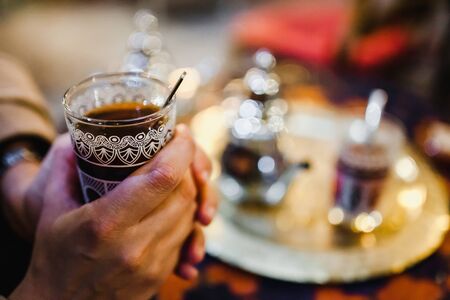Introduction: The Aroma of Tradition
As the first rays of dawn gently caress the bustling streets of India, there is an unmistakable aroma that lingers in the air—a fragrance woven with memories, rituals, and celebration. In this land of vibrant festivals and grand weddings, the act of brewing is much more than a culinary necessity; it is an art form, steeped in tradition and symbolism. From the sacred clinking of copper vessels to the rhythmic pouring from age-old brass pots, traditional brewing equipment plays a subtle yet profound role in every Indian festivity. Whether it’s a wedding marked by laughter and intricate customs or a festival echoing with music and dance, these humble utensils become silent storytellers, connecting generations through shared tastes and timeless rituals. Today, we set out on a journey to explore how these brewing artifacts shape the essence of Indian celebrations—infusing every gathering with warmth, hospitality, and the unmistakable aroma of tradition.
2. Classic Equipment: From Matka to Brass Samovar
India’s weddings and festivals are a vibrant tapestry of flavours, aromas, and rituals woven together with time-honoured brewing equipment that stands as silent witnesses to countless celebrations. Each region brings its own traditional vessels—earthen matkas, gleaming brass handis, sturdy copper lotas, and ornate samovars—each telling stories of family, hospitality, and heritage.
Let’s embark on a flavourful journey through these iconic brewing tools:
| Brewing Tool | Material | Popular Use | Cultural Significance |
|---|---|---|---|
| Matka | Earthenware (Clay) | Storing & cooling water, brewing local drinks like chaas or thandai | Symbolises purity and earthiness; used in wedding rituals for ‘matka phod’ ceremonies |
| Brass Handi | Brass | Slow-cooking curries, biryanis, and brewing festive beverages like kheer or payasam | Blessings of prosperity; often passed down generations as heirlooms during weddings |
| Copper Lota | Copper | Serving water, making herbal teas (kadha), or offering sacred water in rituals | Associated with health benefits; considered auspicious in pujas and wedding rites |
| Samovar | Brass/Copper (often intricately designed) | Brewing Kashmiri Kahwa or masala chai for gatherings and celebrations | A centrepiece at North Indian and Kashmiri festivities; symbolises warmth and togetherness |
The gentle coolness of water from a matka during a summer mehendi ceremony, or the aroma wafting from a brass handi simmering over charcoal at a wedding feast—these experiences are far more than culinary. They evoke nostalgia, connect generations, and ground every celebration in India’s rich cultural soil. Even today, amidst modern glassware and stainless steel, these classic pieces hold pride of place in Indian households during shaadis (weddings) and utsavs (festivals), ensuring tradition is not just preserved but savoured with every sip.

3. Cultural Significance in Indian Weddings
Indian weddings are renowned for their grandeur, rituals, and the warmth extended to every guest. One of the most cherished symbols of this hospitality is the tradition of serving chai, coffee, and regional beverages brewed using age-old equipment such as brass kettles, copper samovars, and clay pots. These vessels are more than mere tools; they are woven into the very fabric of wedding festivities, representing a bridge between generations and embodying the spirit of togetherness.
In many households, welcoming guests with a steaming cup of masala chai or filter coffee is an unspoken promise of comfort and camaraderie. The act is not just about quenching thirst—its about sharing stories, laughter, and blessings. Traditional brewing equipment elevates this experience, imbuing each sip with nostalgia and a sense of belonging. It is common to see elders overseeing the preparation, ensuring that every batch meets ancestral standards—a practice seen as both an art and a ritual.
The presence of these brewing traditions during pre-wedding functions like mehendi or sangeet transforms the gathering into a vibrant adda—an informal space for heartfelt conversations. Whether it’s the earthy aroma of chai wafting from a matka or the rich notes of South Indian filter coffee from a davara-tumbler set, these elements signal hospitality at its finest. They invite guests to pause, savour the moment, and become part of the celebration’s tapestry.
Moreover, these practices reflect Indias incredible diversity. From Kashmiri kahwa served in ornate samovars to Bengali mishti doi paired with chai in terracotta cups, each region contributes its unique flavour to wedding hospitality. The equipment used is often handed down through generations or chosen specially for auspicious occasions, underscoring their sentimental value within the family. Serving beverages in traditional style thus becomes a way to honour ancestors while blessing new beginnings.
Ultimately, traditional brewing equipment at Indian weddings is more than functional—it’s symbolic. It stands for joy, unity, and an open-hearted welcome that defines Indian celebrations. Every pour from a gleaming kettle or rustic pot carries with it centuries of love and legacy, making these moments unforgettable for all who gather around.
4. Brewing Rituals during Festivals
In the heart of every Indian festival, from the riotous colours of Holi to the luminous nights of Diwali and the harmonious gatherings of Eid, special drinks hold a place of honour. These celebratory beverages, crafted using traditional brewing equipment and ancestral recipes, weave together threads of nostalgia, community, and hospitality. Age-old methods—often passed down through generations—bring alive the spirit of the festival in every sip, transforming ordinary moments into cherished memories.
The Essence of Festive Beverages
During Holi, the air tingles with anticipation as homes are filled with the scent of thandai, a cooling milk-based drink infused with almonds, saffron, rose petals, and warming spices. The preparation involves pounding ingredients with a stone mortar and pestle (sil batta) and blending them in traditional earthen pots. For Diwali, families gather around copper vessels to simmer masala chai or badam doodh, infusing milk with cardamom, saffron, and nuts—a comforting ritual that welcomes guests and lights up chilly evenings. Eid brings forth the elegance of sheer kurma, a sweet vermicelli milk drink slow-cooked in heavy-bottomed pans (patila), often shared after prayers to mark togetherness and joy.
Brewed Traditions Across Regions
| Festival | Signature Drink | Traditional Equipment Used |
|---|---|---|
| Holi | Thandai & Bhaang | Sil Batta (Stone Grinder), Matka (Earthen Pot) |
| Diwali | Masala Chai, Badam Doodh | Pateela (Copper Vessel), Channi (Strainer) |
| Eid | Sheer Kurma | Patila (Heavy Pan), Wooden Ladle (Karchi) |
| Pongal/Harvest Festivals | Pongal Payasam, Filter Coffee | Brass Urli (Large Bowl), South Indian Filter Brewer |
Savouring Community Bonds Through Brewing
The process of preparing these festive drinks is more than culinary—it is communal. Families and neighbours gather around steaming pots and bubbling pans, sharing stories as they stir and pour. The use of heirloom equipment like brass urli or clay matkas connects people to their roots; each vessel carries its own patina of past celebrations. Even today, despite the convenience of modern appliances, many households preserve these rituals as a way to honour tradition and reinforce social ties.
A Sip of Heritage in Every Festival
Ultimately, traditional brewing equipment is not just about technique but about experience—a sensory journey into India’s vibrant culture. Whether it’s the clinking of glasses during Holi or the gentle ladling of payasam at Pongal, each act transforms an ordinary beverage into an offering of love and connection. These drinks become more than refreshments; they are a living testament to heritage, making every festival richer and more meaningful.
5. Community and Togetherness
In the vibrant tapestry of Indian weddings and festivals, traditional brewing equipment does more than prepare beverages—it becomes a catalyst for heartfelt connections. The humble matka, brass samovar, or earthen chulha are more than vessels; they invite people to gather, share stories, and create memories that linger long after the last drop is poured. The aroma of simmering chai or brewing filter coffee weaves through the air, drawing elders, cousins, friends, and neighbours together in spontaneous circles around the stove. In these moments, the act of brewing transcends routine, transforming into a cherished ritual where hands work together—one tending the flame, another stirring spices, someone else serving with a smile.
The Stove as a Social Anchor
During a wedding’s early morning rituals or the late-night revelries of Diwali, the brewing corner turns into an unofficial adda—a place to catch up on family news, swap jokes in Hinglish, and relive childhood tales. This shared warmth fosters a sense of unity that echoes the spirit of sangati (togetherness) so deeply valued in Indian culture. Children listen wide-eyed to grandparents narrating legends over steaming cups of masala chai, while distant relatives become fast friends over endless refills of South Indian filter coffee served in steel tumblers.
A Space for Inclusion
Traditional brewing equipment also breaks down barriers—status, age, and background fade as everyone partakes in this communal experience. Whether it’s serving kadak chai to guests arriving from different states or preparing kahwa for a winter wedding in Kashmir, the act bridges regional and cultural divides. It is not unusual for guests to lend a hand with preparations—grinding spices, fetching water from the well, or simply offering company as the brew bubbles away.
The Legacy of Shared Moments
This collective participation reinforces family bonds and community ties, making traditional brewing a living tradition passed down through generations. Every cup shared around these time-honoured vessels is more than a beverage; it is an invitation to belong. In this way, traditional brewing equipment continues to play its subtle yet significant role in weaving unity and joy into every celebration across India.
6. Preserving Traditions in Modern Times
In the kaleidoscopic world of Indian weddings and festivals, every sip of chai or locally brewed sherbet carries a legacy that whispers tales of ancestral wisdom. As urban life gallops ahead and stainless-steel appliances edge into modern kitchens, one may wonder: how do families keep the soul of traditional brewing alive? The answer is an enchanting dance between memory and innovation, where clay pots (matkas), brass kettles (patilas), and age-old coffee filters quietly persist amidst sleek gadgets. For many Indian households, particularly during grand celebrations, these brewing relics are not just utensils—they are living storytellers. Elders often take centre stage during weddings and festivals, guiding younger family members through the tactile art of roasting spices, blending teas, or fermenting millet brews in copper vessels. This hands-on mentorship is more than a lesson in technique; it is a rite of passage, linking generations through flavourful rituals.
Younger generations, once lured by instant mixes and electric brewers, are now rediscovering the magic woven by ancestral hands. Urban cafes and boutique event planners in cities like Mumbai and Bengaluru have started featuring live brewing counters with traditional equipment—inviting guests to experience the aroma and nostalgia of bygone eras. Social media reels capture not only the process but also the stories behind each vessel: the grandmother’s chai kettle from Amritsar or the family’s brass filter passed down from Kerala. Through such revivals, traditional brewing becomes more than a nod to heritage—it transforms into an Instagram-worthy celebration that resonates with both elders and millennials.
This interplay between old and new is seen most vividly during wedding mornings and festival gatherings. While electric kettles bubble in the background for convenience, it is still the hand-poured decoction from a filter kaapi or the meticulously steeped kadak chai that draws relatives together for long conversations. These shared moments over traditionally brewed beverages become anchors in fast-paced lives—a way to pause, connect, and honour roots.
Ultimately, preserving these brewing traditions in contemporary times is less about resisting change and more about selective adaptation. Indian families masterfully weave ancestral methods into modern routines: serving masala chai from antique teapots at sangeet functions, or hosting workshops on local craft brews during Holi. In doing so, they ensure that every wedding toast or festival greeting carries not just taste but also timeless warmth—the kind only tradition can brew.


